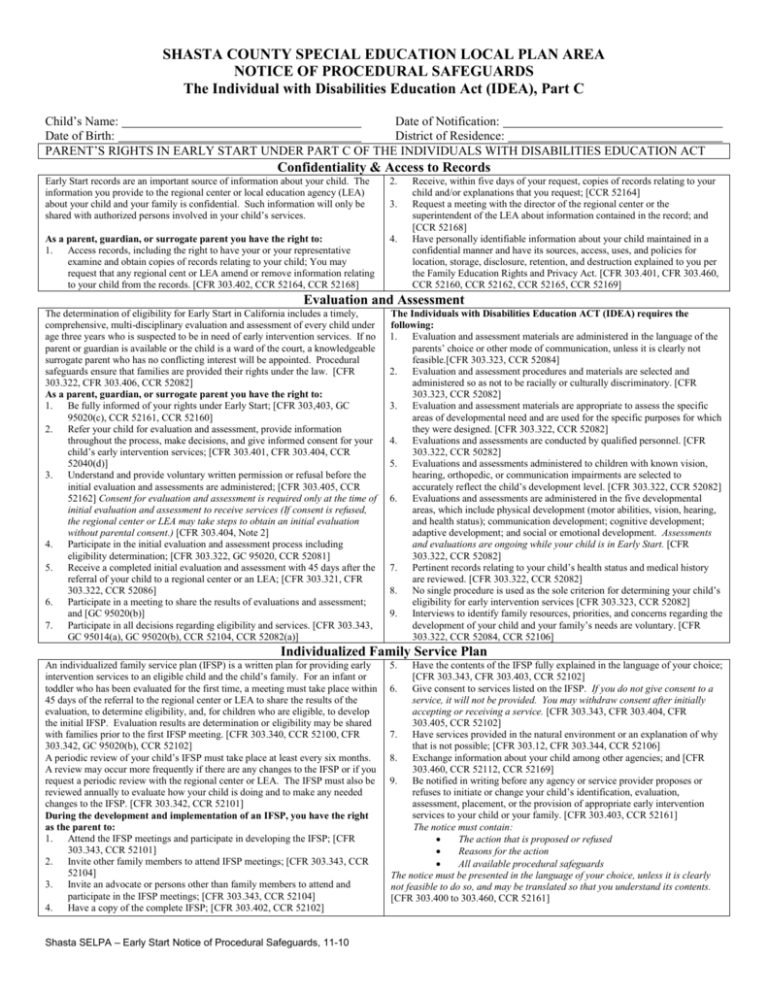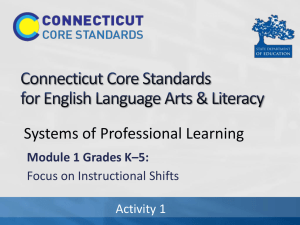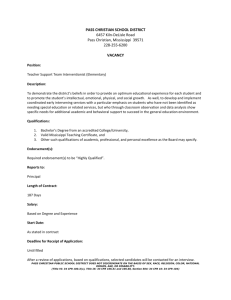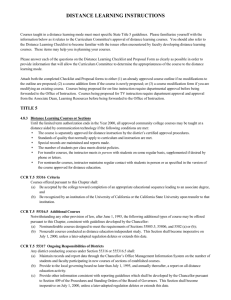Procedural Safeguards - Shasta County Office of Education
advertisement

SHASTA COUNTY SPECIAL EDUCATION LOCAL PLAN AREA
NOTICE OF PROCEDURAL SAFEGUARDS
The Individual with Disabilities Education Act (IDEA), Part C
Child’s Name:
Date of Notification:
Date of Birth:
District of Residence:
PARENT’S RIGHTS IN EARLY START UNDER PART C OF THE INDIVIDUALS WITH DISABILITIES EDUCATION ACT
Confidentiality & Access to Records
Early Start records are an important source of information about your child. The
information you provide to the regional center or local education agency (LEA)
about your child and your family is confidential. Such information will only be
shared with authorized persons involved in your child’s services.
2.
As a parent, guardian, or surrogate parent you have the right to:
1. Access records, including the right to have your or your representative
examine and obtain copies of records relating to your child; You may
request that any regional cent or LEA amend or remove information relating
to your child from the records. [CFR 303.402, CCR 52164, CCR 52168]
4.
3.
Receive, within five days of your request, copies of records relating to your
child and/or explanations that you request; [CCR 52164]
Request a meeting with the director of the regional center or the
superintendent of the LEA about information contained in the record; and
[CCR 52168]
Have personally identifiable information about your child maintained in a
confidential manner and have its sources, access, uses, and policies for
location, storage, disclosure, retention, and destruction explained to you per
the Family Education Rights and Privacy Act. [CFR 303.401, CFR 303.460,
CCR 52160, CCR 52162, CCR 52165, CCR 52169]
Evaluation and Assessment
The determination of eligibility for Early Start in California includes a timely,
comprehensive, multi-disciplinary evaluation and assessment of every child under
age three years who is suspected to be in need of early intervention services. If no
parent or guardian is available or the child is a ward of the court, a knowledgeable
surrogate parent who has no conflicting interest will be appointed. Procedural
safeguards ensure that families are provided their rights under the law. [CFR
303.322, CFR 303.406, CCR 52082]
As a parent, guardian, or surrogate parent you have the right to:
1. Be fully informed of your rights under Early Start; [CFR 303,403, GC
95020(c), CCR 52161, CCR 52160]
2. Refer your child for evaluation and assessment, provide information
throughout the process, make decisions, and give informed consent for your
child’s early intervention services; [CFR 303.401, CFR 303.404, CCR
52040(d)]
3. Understand and provide voluntary written permission or refusal before the
initial evaluation and assessments are administered; [CFR 303.405, CCR
52162] Consent for evaluation and assessment is required only at the time of
initial evaluation and assessment to receive services (If consent is refused,
the regional center or LEA may take steps to obtain an initial evaluation
without parental consent.) [CFR 303.404, Note 2]
4. Participate in the initial evaluation and assessment process including
eligibility determination; [CFR 303.322, GC 95020, CCR 52081]
5. Receive a completed initial evaluation and assessment with 45 days after the
referral of your child to a regional center or an LEA; [CFR 303.321, CFR
303.322, CCR 52086]
6. Participate in a meeting to share the results of evaluations and assessment;
and [GC 95020(b)]
7. Participate in all decisions regarding eligibility and services. [CFR 303.343,
GC 95014(a), GC 95020(b), CCR 52104, CCR 52082(a)]
The Individuals with Disabilities Education ACT (IDEA) requires the
following:
1. Evaluation and assessment materials are administered in the language of the
parents’ choice or other mode of communication, unless it is clearly not
feasible.[CFR 303.323, CCR 52084]
2. Evaluation and assessment procedures and materials are selected and
administered so as not to be racially or culturally discriminatory. [CFR
303.323, CCR 52082]
3. Evaluation and assessment materials are appropriate to assess the specific
areas of developmental need and are used for the specific purposes for which
they were designed. [CFR 303.322, CCR 52082]
4. Evaluations and assessments are conducted by qualified personnel. [CFR
303.322, CCR 50282]
5. Evaluations and assessments administered to children with known vision,
hearing, orthopedic, or communication impairments are selected to
accurately reflect the child’s development level. [CFR 303.322, CCR 52082]
6. Evaluations and assessments are administered in the five developmental
areas, which include physical development (motor abilities, vision, hearing,
and health status); communication development; cognitive development;
adaptive development; and social or emotional development. Assessments
and evaluations are ongoing while your child is in Early Start. [CFR
303.322, CCR 52082]
7. Pertinent records relating to your child’s health status and medical history
are reviewed. [CFR 303.322, CCR 52082]
8. No single procedure is used as the sole criterion for determining your child’s
eligibility for early intervention services [CFR 303.323, CCR 52082]
9. Interviews to identify family resources, priorities, and concerns regarding the
development of your child and your family’s needs are voluntary. [CFR
303.322, CCR 52084, CCR 52106]
Individualized Family Service Plan
An individualized family service plan (IFSP) is a written plan for providing early
intervention services to an eligible child and the child’s family. For an infant or
toddler who has been evaluated for the first time, a meeting must take place within
45 days of the referral to the regional center or LEA to share the results of the
evaluation, to determine eligibility, and, for children who are eligible, to develop
the initial IFSP. Evaluation results are determination or eligibility may be shared
with families prior to the first IFSP meeting. [CFR 303.340, CCR 52100, CFR
303.342, GC 95020(b), CCR 52102]
A periodic review of your child’s IFSP must take place at least every six months.
A review may occur more frequently if there are any changes to the IFSP or if you
request a periodic review with the regional center or LEA. The IFSP must also be
reviewed annually to evaluate how your child is doing and to make any needed
changes to the IFSP. [CFR 303.342, CCR 52101]
During the development and implementation of an IFSP, you have the right
as the parent to:
1. Attend the IFSP meetings and participate in developing the IFSP; [CFR
303.343, CCR 52101]
2. Invite other family members to attend IFSP meetings; [CFR 303.343, CCR
52104]
3. Invite an advocate or persons other than family members to attend and
participate in the IFSP meetings; [CFR 303.343, CCR 52104]
4. Have a copy of the complete IFSP; [CFR 303.402, CCR 52102]
Shasta SELPA – Early Start Notice of Procedural Safeguards, 11-10
5.
Have the contents of the IFSP fully explained in the language of your choice;
[CFR 303.343, CFR 303.403, CCR 52102]
6. Give consent to services listed on the IFSP. If you do not give consent to a
service, it will not be provided. You may withdraw consent after initially
accepting or receiving a service. [CFR 303.343, CFR 303.404, CFR
303.405, CCR 52102]
7. Have services provided in the natural environment or an explanation of why
that is not possible; [CFR 303.12, CFR 303.344, CCR 52106]
8. Exchange information about your child among other agencies; and [CFR
303.460, CCR 52112, CCR 52169]
9. Be notified in writing before any agency or service provider proposes or
refuses to initiate or change your child’s identification, evaluation,
assessment, placement, or the provision of appropriate early intervention
services to your child or your family. [CFR 303.403, CCR 52161]
The notice must contain:
The action that is proposed or refused
Reasons for the action
All available procedural safeguards
The notice must be presented in the language of your choice, unless it is clearly
not feasible to do so, and may be translated so that you understand its contents.
[CFR 303.400 to 303.460, CCR 52161]
Complaints, Mediation Conferences, and Due Process Hearings
In Early Start, parents have rights and protections to assure that early intervention
services are provided to their children in a manner appropriate to their needs, in
consideration of family concerns, and in compliance with applicable federal and
State statutes and regulations. The following procedures are only for children
under the age of three years. [CFR 303.422, CCR 52170, CCR 52172, CCR
52173, CCR 52174]
As a parent, guardian, or surrogate parent you have the right to:
1. Request a mediation conference and/or a due process hearing any time a
regional center or LEA proposes or refuses to initiate or change the
identification, evaluation, assessment, placement, and/or provision of
appropriate early intervention service(s); [CFR 303.420, CCR 52172]
2. Be informed of your right to file a complaint, and [CFR 303.510, CCR
52170]
3. File a complaint if you believe there has been a violation of any law
governing early intervention services under Early Start [CFR 303.511, CCR
52170]
COMPLAINTS
Any individual or organization may file a signed, written complaint against the
Department of Developmental Services (DDS), the California Department of
Education (CDE), or any regional center, LEA, or private service provider that
receives Part C funds alleging violations of State or federal early intervention
statutes or regulations. Information or assistance in filing complaints is available
from your child’s service coordinator, the regional center office, or the special
education local plans are (SELPA). DDS and CDE are available for consultation
regarding the filing of a complaint. Additional assistance is available for
consultation regarding the filing of a complaint. Additional assistance is available
from advocacy organizations such as Area Boards or Protection and Advocacy,
Inc. As efforts to resolve the matter at the local level are undertaken, a complaint
may be filed concurrently with a request for mediation conference and/or due
process hearing. [CFR 303.501, CFR 303.510, CFR 303.511, CCR 52170]
Complaints are filed directly with the:
Department of Developmental Services
Office of Human Rights and Advocacy Services
Early Start Complaint Unit
1600 9th Street, MS 2-15
Sacramento, CA 95814
[CFR 303.510, CCR 52170]
Any individual or organization who files a complaint has the right to [CFR
303.511, CCR 52170]
1. Receive assistance in filing the complaint from the service coordinator,
regional center, or LEA; [CCR 52170]
2. Not be compelled to use any other procedures under the Education Code or
the Lanterman Developmental Disabilities Services Act to resolve the
complaint; [CFR 303.510, CCR 52170, GC 95006]
3. Submit a written decision within 60 days of the date DDS receives the
complaint; and [CCR 52171]
4. Receive a written decision within 60 days of the date DDS receives the
complaint; and [CCR 52171]
5. Request a review by the Secretary of the U.S. Office of Education if not
satisfied with the findings. [CFR 303.512]
The complaint must
1. Be in writing and contain a signed statement alleging that DDS, CDE, the
regional center, LEA, or other service provider involved with Early Start has
violated a federal or State law or regulation; [CFR 303.511, CCR 52170]
2. Contain a statement of facts upon which the violation is based; [CFR
303.511, CCR 52170]
3. Include the name of the party allegedly responsible; and [CCR 52170]
4. Provide the name, address, and phone number of the complainant. [CCR
52170]
The complaint may also include, if applicable, a description of the voluntary steps
taken at the local level to resolve the complaint. [CCR 52170]
Signature of Parent/Guardian
MEDIATION CONFERENCES AND PROCESS HEARINGS
All parents are encouraged to resolve differences at the lowest administrative level
possible. When differences cannot be resolved, voluntary impartial mediation and
due process hearings are available. You as a parent, are encouraged to seek
assistance from either your child’s service coordinator, the regional center, or the
SELPA Office. [CFR 303.420, CCR 52172, CCR 52173, CCR 52174]
Circumstances leading to a mediation or due process hearing may be
disagreements related to a proposal or refusal for identification, evaluation,
assessment, placement or services.
These procedures may be used to resolve differences between you and a regional
center of LEA. Your child will continue to receive the early intervention services
identified on the IFSP that he/she is currently receiving unless the parties agree
otherwise. If your disagreement involves a new service that has not started, your
child will receive all services identified on the IFSP that are not in dispute.
Requests for a mediation conference and/or a due process hearing are filed
with the Office of Administrative Hearings serving your county:* [CFR
303.420, CCR 52172]
Shasta County
Office of Administrative Hearings
Attn: Early Intervention Section
560 J Street, Suite 300
Sacramento, CA 95814
(916) 445-4926 Fax (916) 323-6439
*The mediation conference and/or due process hearing request form may be
obtained from your service coordinator, the regional center, the LEA, and DDS.
The impartial mediation conference and/or due process hearing must be
completed within 30 days or receipt of the request by the Office of Administrative
Hearings. The timely issuance of the written decision may not be delayed by any
concurrent voluntary local efforts to resolve the matter. The decision will be final
unless appealed. [CFR 303.422, CFR 303.423, CCR 52172]
As a parent, you have the right to: {CFR 303.422, CCR 52172]
1. Have the mediation conference and/or due process hearing conducted by an
impartial person not employed by an agency serving your child who is
knowledgeable in the laws relating to early intervention and the service
needs of infants, toddlers, and families; [CFR 303.421, CCR 52174, CCR
52172]
2. Require that the proceeding is carried out at a time and in a location that is
reasonably convenient for you; [CFR 303.423, CCR 52172]
3. Have all personally identifiable information maintained in a confidential
manner; [CFR 303.460, CCR 52160, CCR 52169]
4. Bring a civil action against the other party following completion of the
proceeding if you disagree with the results; and [CFR 303.424]
5. Receive services identified on the IFSP that are not in dispute. [CFR
303.425, CCR 52172]
During a due process hearing, you also have the right to:
1. Be accompanied and advised by counsel and/or by individuals with special
knowledge with respect to early intervention services for children under age
three years; [CFR 303.422, CCR 52174]
2. Confront, cross-examine, and compel the attendance of witnesses; [CFR
303.422, CCR 52174]
3. Present evidence, including an independent evaluation obtained at private
expense and disclosed to the other party, at least five days prior to the start of
the proceedings; [CFR 303.422, CCR 52174]
4. Prohibit the introduction of any evidence at the proceeding that has not been
disclosed to you at least five days before the proceeding begins; [CFR
303.422, CCR 52174]
5. Obtain a written or electronic verbatim transcription of the proceeding; and
[CFE 303.422, CCR 52174]
6. Obtain written finds of facts and decisions within 30 days from the date the
request is filed. [CFR 303.422, CCR 52174]
Date
I certify that, to the best of my knowledge and ability, the above parent has been informed of and received a copy of this 2-page
Notice of Procedural Safeguards
Signature of School Employee
Shasta SELPA – Early Start Notice of Procedural Safeguards, 11-10
Date






